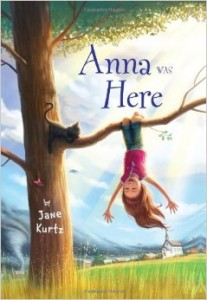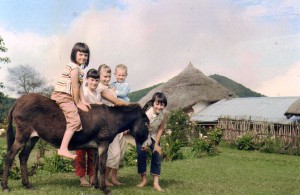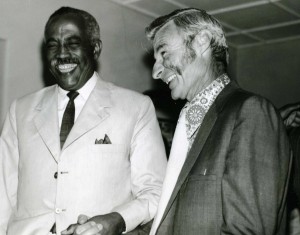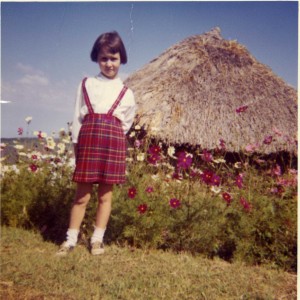I recently read Anna Was Here by Jane Kurtz. Anna is the young daughter of a minister, growing up in Colorado, when her father decides to move his family to Kansas in order to help his home church through a rough period. Anna resists the move and wants to go home, to the place where she feels like she belongs and where her parents aren’t obsessed with their own concerns. I remember moving from Albuquerque, New Mexico to El Paso, Texas when I was about Anna’s age and the emotional devastation that occurred because I felt ripped from the only life I had known and thrust into a life I didn’t welcome or want so I identified strongly with Anna. Most kids will.
I interviewed Jane about the themes in Anna Was Here.
I’m intrigued by the roots of this question Anna keeps returning to. What is the difference between “luck” and “the hand of God”? Can you talk about why this question is important to consider and how it reveals itself in Anna’s life? Do you think Anna ever reaches any conclusions or any answers?
Kurtz: It’s fair to say I’m intrigued by that question, too! I grew up in Ethiopia where my parents worked for the Presbyterian Church for 23 years. I heard a lot of conversation when I was Anna’s age about how God takes care of (as Anna puts it) sparrows and us. At the same time, I saw children around me in heartbreaking situations. It’s a very common experience for me to talk to people who believe to their depths that God took care of them in a time of sickness or disaster. Don’t we all want to feel we aren’t totally helpless in the face of terrible possibilities? And at the same time I’ve lived through a natural disaster that destroyed our church and neighborhood. Starting when I was in college, I watched Ethiopia, a Christian country and a place of deep faith, plunge into and try to slowly recover from a time of red terror and desperate suffering. For me, Anna Was Here is a book about life’s big questions…with a few puny answers. Anna is still frustrated by big questions at the end of the story but I think she’s wobbling toward an understanding that in the midst of all the unanswered questions about why bad things happen to good people, we do have choices that have to do with our own hearts.
Anna feels betrayed by her father. I’d love to hear you talk about the delicate dance performed by this daughter & father as they work out the details of their relationship in this new context.
Kurtz: My dad was a complicated guy. He was funny and charismatic and wise. People adored him and thought my siblings and I were so lucky to have him as a father. But it isn’t easy being a child of someone who has big dreams of making the world a better place. I’m sure my three kids would say the same thing about me, about my passion for writing fiction and for my volunteer work for Ethiopia Reads. I guess all I know how to say is that I think fiction is all about offering people an experience—in this case, an experience of a family like the ones I know well.
Anna feels betrayed by her father but we soon see a contrast between what she feels and the reality experienced by her cousin Morgan, who was betrayed by her dad. Was this contrast deliberate or subconscious? Does Morgan’s reality influence Anna’s ability to forgive her dad for his shortcomings?
Kurtz: It took me a long time to figure out Anna and Morgan’s relationship. Again, I go back to my own childhood. I grew up not knowing my cousins—because my family lived half a world away—and feeling both connected to and baffled by them when I saw them every five years. At one point as I was wrestling with my story, I asked myself, where is Morgan’s dad, anyway, and why is she so determined to not let Anna into that treehouse? The things our characters hide are often the best ways to understand motivation. I tried other solutions before this one came and felt right partly because of the symmetry: Morgan and Simon and Anna all trying to come to grips with a world without the comfort and protection of a dad.
The book traces threads of a long-standing controversy over pacifism and patriotism. In this book, the roots date back to the first world war and people’s heritage. This is tangled up together with people’s stubbornness and inability to forgive each other–part of growing up in any community where people’s lives are intertwined so indelibly. I’m not sure there’s a question here but I’d sort of love to hear your comments on my observation.
Kurtz: The Mennonite community where my husband grew up in Kansas has been fascinating to me from the first time I visited and started being part of family reunions where I got to hear stories of the long journey that led people from Germany and Switzerland to Russia to what became the wheat fields of central America. Later I lived for five years near his childhood farm. The roots between people are deep and tangled there, which always seems exotic to me, someone who grew up as a wanderer. My Mennonite friends feel the Bible is absolutely clear on peacemaking. My dad flew airplanes in World War II and I didn’t grow up in a part of the church that thinks the Bible is quite so clear…so that’s interesting to me: where is the place of certainty in faith and where is the place of questioning? There’s also a funny side to all of us who believe in peace and peacemaking but can’t quite pull that off in our daily lives and attitudes toward each other. Didn’t you find it funny that the community I created for the book is hostile about whether “Blessed are the peacemakers” should appear on the church sign? My family heritage is intense idealism and a sense of humor. So I guess it’s inevitable that I’ll have a sense of humor about idealism.
You show an insider’s viewpoint of the church and church culture. Can you talk a little bit about what church culture can offer the world, as well as deficiencies within it? Why is it important for insiders and outsiders alike to understand, experience, and know something about this particular culture?

The FEMA trailers Jane Kurtz lived in after her home was wiped out by a flood in Grand Forks, North Dakota.
Kurtz: My dad was a Presbyterian minister and when I met my husband—who grew up Mennonite and became a Presbyterian minister—I wasn’t going to church. At that point (probably like a lot of people in their twenties) I saw the wide gulf between what people say in church and how we are actually able to live. My husband was a campus minister, a perfect place for him because he resists institutions. When the university becomes an institution a lot of its purity of intention about learning and teaching flies out the window. When the church becomes an institution some odd things happen to spiritual truths. He was right there in the crack between the church as institution and the university as institution, and I was drawn to his intellectual curiosity and his interesting language that felt fresh and real. By the time I (astonishingly) found myself a minister’s wife, I had changed my mind about being a church member because I stopped seeing church as a place of hypocrisy and started seeing it as a place where the brave and interesting questions about the meaning of life get asked and struggled with.
Anna, like me, has grown up inside the church…with lots of questions. I’m pleased that even though I grew up in a community that took the Bible utterly seriously, I wasn’t squashed or condemned for being someone who didn’t find an easy path to faith. Fiction offers us a look at people like us and also a look at people very unlike us. So I guess my hope would be that some readers would see themselves in Anna—and feel that delicious sense of being known and understood. Other readers will get a window into another culture, something that authors like Amy Tan gave me as a reader and something I know my books set in Ethiopia have given many readers. To read well is to feel inside the skin of another human being. It has widened and deepened me to do that, and I hope to pass that experience on to other readers.
I was disturbed and disheartened by the adults’ coldhearted lack of sympathy for Simon who is, after all, a child–one who is suffering from enormous grief. Why do you think we so easily dismiss a child’s grief? Why do we focus on the importance of things and icons (e.g., the church building) over the needs of a child or another human being?
Kurtz: Churches can be very attractive for rule followers. Some of the church members in the place I invented would think it wrong to dismiss or minimize bad behavior no matter what the cause (or, as they might say, excuse). Also I think faith communities can definitely fail people who are grieving. I think we can sound dismissive without ever meaning to, when—in fact—we are longing to offer comfort and are feeling overwhelmed and uncomfortable. Not long after my parents started language study in Ethiopia, their 3-month-old baby died, and my dad talked his whole life about their Ethiopian neighbors who came and simply sat with them and were present to their grief. I have a sister whose husband died just before Christmas this year, and she went to Ethiopia knowing that their friends there would mourn with her in a way she needed to mourn, something she didn’t find in her American church and community. As I was crafting my story, I wanted a motivation for Simon that would make Anna know deep down she should feel sympathy…but honestly isn’t it almost impossible to feel sympathetic toward someone who is being mean to us, no matter what we should feel? I was hoping to capture some of the complexity of forgiveness. So easy to talk about, so hard to truly do.




1 comment for “Anna Was Here, asking the hard questions of life”